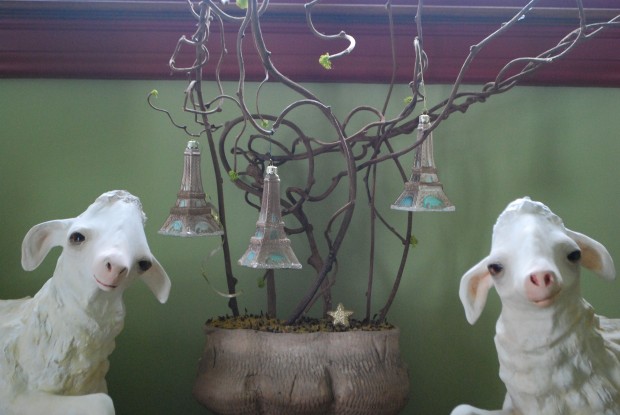For the past three years, my sister in law Tine has sent me a Christmas ornament of the Eiffel Tower. That is, she sends the same ornament, every year. I don’t really know who makes them, or where she buys them, but I choose to believe she buys them in Paris, and brings them home for me. This may be nonsense-her local Ace Hardware may carry them. Or maybe she found 20 of them in a resale shop somewhere. I only know I have never seen them anywhere but on this kiwi topiary tree in my dining room. Not that I need any explanation. They are beautiful-a very delicate pale gold and an equally elegant pale blue. Like I imagine Paris to be.
I will interpret the meaning of this gift for you. Pete and Tine go to Paris every year, in the spring. She wants me to go with them to Paris, in late May. Any year would be fine. They would stay as long as I liked. They would take me anywhere else in France I would like to go, for as long as I wanted. We would see the gardens, of course. But we would also see the shops the markets, and the museums-and surely, the Eiffel Tower. Normandy-we would go. The south of France-we would linger there. She is extraordinarily patient about this request. She does not lecture, berate, or attempt to persuade me. She just sends me the Eiffel Tower Christmas ornament-a beautiful reminder of what could be.
There are so many places I would like to visit-the end of May. France of course, and surely all of Italy. The Chelsea Flower showI am certain it is extraordinary. As for the Netherlands and Belgium-a spring trip would be lovely. The spring in Spain-what is that like? Does Iceland have a spring? South Africa-I imagine the country, the wild flowers, and the gardens turn plenty of gardening heads in the spring. Don’t forget Texas, or Philadelphia, or Scotland, or Vancouver. I hear that the Appalachian mountains are beautiful in the spring. What place on earth wouldn’t be grand in the spring?
It’s a good thing that I have a landscape and garden. I am always home in the spring, more often than not, working. Most of my exposure to spring in other places is anecdotal. Other people’s gardens. Other people’s trips in the spring. Other people’s photographs. via ther people’s writings, drawings, publications and music. Lucky for me, considering I live inside my own world much more than out there. A new year brings possibilities with it. I have a standing opportunity to go to Paris. And a standing date with the garden, come spring.
